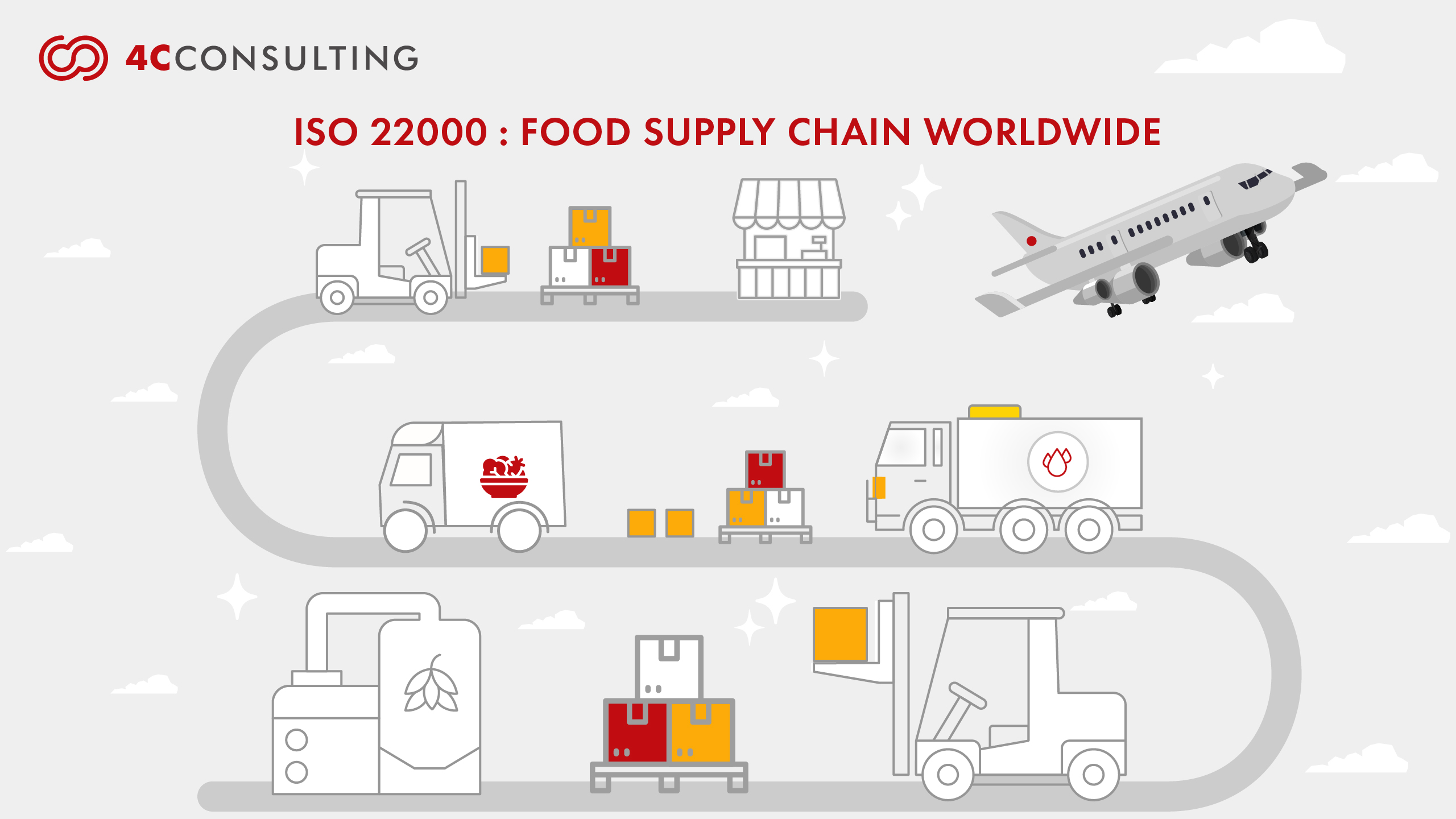
ISO 22000: SAFEGUARDING THE FOOD SUPPLY CHAIN WORLDWIDE
27th Jul, 2024
In a world where globalization has made the food supply chain more complex, ensuring the safety of food products from farm to fork has become critically important. The movement of food products across various countries and involving multiple stakeholders increases the risk of contamination and foodborne illnesses. Any breach in food safety can lead to significant health risks and economic repercussions. To address these challenges ISO 22000 the international standard for food safety management systems, offers a robust framework to ensure food safety throughout the entire supply chain. This blog explores the significance of ISO 22000 how it secures the food supply chain and its benefits for global food safety.
.
ISO 22000 OVERVIEW
ISO 22000 is a globally recognized standard that outlines the requirements for a food safety management system (FSMS). It aims to ensure that food products are safe for consumption and is applicable to all organizations in the food chain, irrespective of size and complexity, from primary producers to food manufacturers, transport and storage operators, and retailers. This comprehensive approach covers every stage of the food supply chain, addressing potential hazards and ensuring robust controls are in place.
.
CORE ELEMENTS OF ISO 22000 FSMS:
- Interactive Communication: Effective communication throughout the food supply chain is crucial for identifying and controlling food safety hazards. This includes clear communication between suppliers, manufacturers, and customers to ensure that risks are managed at every stage. Regular updates and transparent information sharing help in pre-empting potential issues and coordinating timely responses.
- System Management: ISO 22000 integrates food safety management into the overall management system of the organization. This ensures that food safety considerations are aligned with business objectives and embedded in the organization’s culture and practices. It promotes a systematic approach where food safety is prioritized alongside other critical business operations.
- Prerequisite Programs (PRPs): PRPs are essential conditions and activities necessary to maintain a hygienic environment throughout the food chain. These include good manufacturing practices (GMP), good hygiene practices (GHP), and good agricultural practices (GAP), which form the foundation for producing safe food. PRPs ensure that basic conditions are met, which supports the overall food safety management system.
- HACCP Principles: The Hazard Analysis and Critical Control Points (HACCP) approach is a systematic method for identifying, evaluating, and controlling food safety hazards. ISO 22000 incorporates HACCP principles to ensure that hazards are effectively managed at critical points in the process. By focusing on critical control points, organizations can proactively manage risks and prevent contamination.
.
FOOD SAFETY AT DIFFERENT STAGES OF THE SUPPLY CHAIN
Food safety risks can emerge at any stage of the supply chain, making it essential to have robust controls in place from production to consumption. ISO 22000 addresses these risks at various stages:
- Primary Production:
- Good Agricultural Practices (GAP): Implementing GAP helps minimize risks associated with farming activities, such as the use of pesticides, ensuring soil health, and maintaining clean water sources. These practices are fundamental in producing safe raw materials for the food industry. GAP ensures that the initial stages of food production set the right standards for safety and quality.
- Animal Health and Welfare: Proper animal husbandry practices and veterinary care are crucial for preventing zoonotic diseases that can be transmitted to humans through food. Ensuring the health and welfare of animals reduces the risk of contamination at the source. Healthy animals lead to safer food products, mitigating risks from the very beginning.
- Processing And Manufacturing:
- Good Manufacturing Practices (GMP): GMP ensures that food products are consistently produced and controlled according to quality standards. This includes proper maintenance of equipment, employee hygiene, and contamination control. GMP forms the backbone of safe food production. By adhering to GMP, manufacturers can maintain high standards of hygiene and operational efficiency.
- Hazard Analysis and Critical Control Points (HACCP): HACCP involves identifying critical control points in the manufacturing process where hazards can be prevented, eliminated, or reduced to acceptable levels. This proactive approach ensures that potential risks are managed effectively. By implementing HACCP, manufacturers can systematically manage and reduce the risk of foodborne illnesses.
- Storage and Transportation:
- Temperature Control: Maintaining appropriate temperatures during storage and transportation is crucial to prevent the growth of harmful microorganisms. Proper temperature control helps preserve the quality and safety of food products. Temperature monitoring and control systems ensure that perishable goods remain safe throughout the supply chain.
- Cleanliness and Sanitation: Ensuring that storage facilities and transportation vehicles are clean and free from contaminants is vital for preventing foodborne illnesses. Regular sanitation practices reduce the risk of cross-contamination. Clean and sanitized storage and transport conditions are critical in maintaining the integrity of food products.
- Retail and Distribution:
- Good Hygiene Practices (GHP): Implementing hygiene standards in retail outlets prevents cross-contamination and ensures food safety. Retailers play a critical role in maintaining the safety of food products until they reach the consumer. Retail environments must adhere to strict hygiene protocols to prevent contamination at the point of sale.
- Traceability Systems: Ensuring that food products can be traced back to their source is essential in case of a food safety incident. Traceability systems enable quick and effective recalls, protecting consumers and maintaining trust in the food supply chain. Effective traceability systems enhance transparency and accountability across the supply chain.
- Consumer Handling:
- Consumer Education: Educating consumers about safe food handling practices, such as proper cooking temperatures and avoiding cross-contamination in the kitchen, is crucial for preventing foodborne illnesses. Empowering consumers with knowledge help ensure food safety at the final stage. Informed consumers can make better decisions about food safety, reducing the risk of foodborne illnesses.
.
BENEFITS OF ISO 22000 FOR GLOBAL FOOD SAFETY
Implementing ISO 22000 offers numerous benefits that contribute to global food safety:
- Enhanced Food Safety: By implementing a comprehensive food safety management system, organizations can ensure that food products are safe for consumption, thereby protecting public health. ISO 22000 provides a structured approach to identifying and managing food safety risks. Enhanced food safety measures reduce the likelihood of foodborne illnesses and related health issues.
- Regulatory Compliance: ISO 22000 helps organizations meet regulatory requirements and avoid penalties associated with non-compliance. It provides a systematic approach to managing food safety risks and demonstrates a commitment to quality and safety. Compliance with regulatory standards ensures that organizations operate within legal frameworks, avoiding fines and legal challenges.
- Improved Customer Confidence: ISO 22000 Certification enhances customer trust and confidence in the safety of food products. It serves as a mark of quality that reassures customers that the organization follows internationally recognized food safety practices. When customers trust the safety of food products, it enhances brand loyalty and market reputation.
- Reduced Risk of Foodborne Illnesses: By identifying and controlling food safety hazards, ISO 22000 reduces the risk of foodborne illnesses. This not only protects consumers but also prevents costly product recalls and damage to brand reputation. Reducing foodborne illnesses helps maintain public health and safety, contributing to societal well-being.
- Market Access and Competitiveness: ISO 22000 certification opens up new market opportunities and enhances competitiveness. Many retailers and buyers require suppliers to be certified to ISO 22000, making it essential for organizations looking to expand their market reach. Certification to ISO 22000 can be a key differentiator in competitive markets, providing access to new customers and regions.
- Operational Efficiency: Implementing ISO 22000 leads to improved operational efficiency by streamlining processes and reducing waste. It fosters a culture of continuous improvement, where food safety is integrated into the organization’s overall management system. Efficient operations not only enhance food safety but also contribute to cost savings and productivity.
- Global Recognition: ISO 22000 is recognized and respected worldwide. Certification demonstrates that an organization adheres to international food safety standards, making it easier to do business globally. This global recognition is particularly beneficial for organizations involved in international trade. Being recognized for food safety standards opens up global business opportunities and builds international partnerships.
ISO 22000 plays a vital role in safeguarding the food supply chain worldwide. By providing a comprehensive framework for food safety management, it ensures that food products are safe from production to consumption. Implementing ISO 22000 not only enhances food safety but also offers numerous benefits, including regulatory compliance, improved customer confidence, and increased market access. As the global food supply chain continues to grow in complexity. Organizations that adopt ISO 22000 are better equipped to navigate the challenges of the modern food industry and protect public health. Adopting ISO 22000 demonstrates a commitment to excellence in food safety and positions organizations as leaders in the industry.
.
HOW 4C CONSULTING CAN HELP YOUR ORGANIZATION ACHIEVE ISO 22000 CERTIFICATION?
4C Consulting has empowered food businesses across the globe to achieve ISO 22000 certification and expand rapidly in international markets. With over 9000+ hours of training provided, we have successfully assisted 180+ clients in acquiring 270+ ISO 22000 certifications, enabling them to implement the best food safety practices. Our highly qualified and experienced team of 15+ consultants has dedicated over 15000+ hours to help our clients achieve ISO 22000 certification. By partnering with us, you can accelerate your food business and establish a strong position in international markets. contact us now to start your journey towards ISO 22000 certification and elevate your food safety standards.
